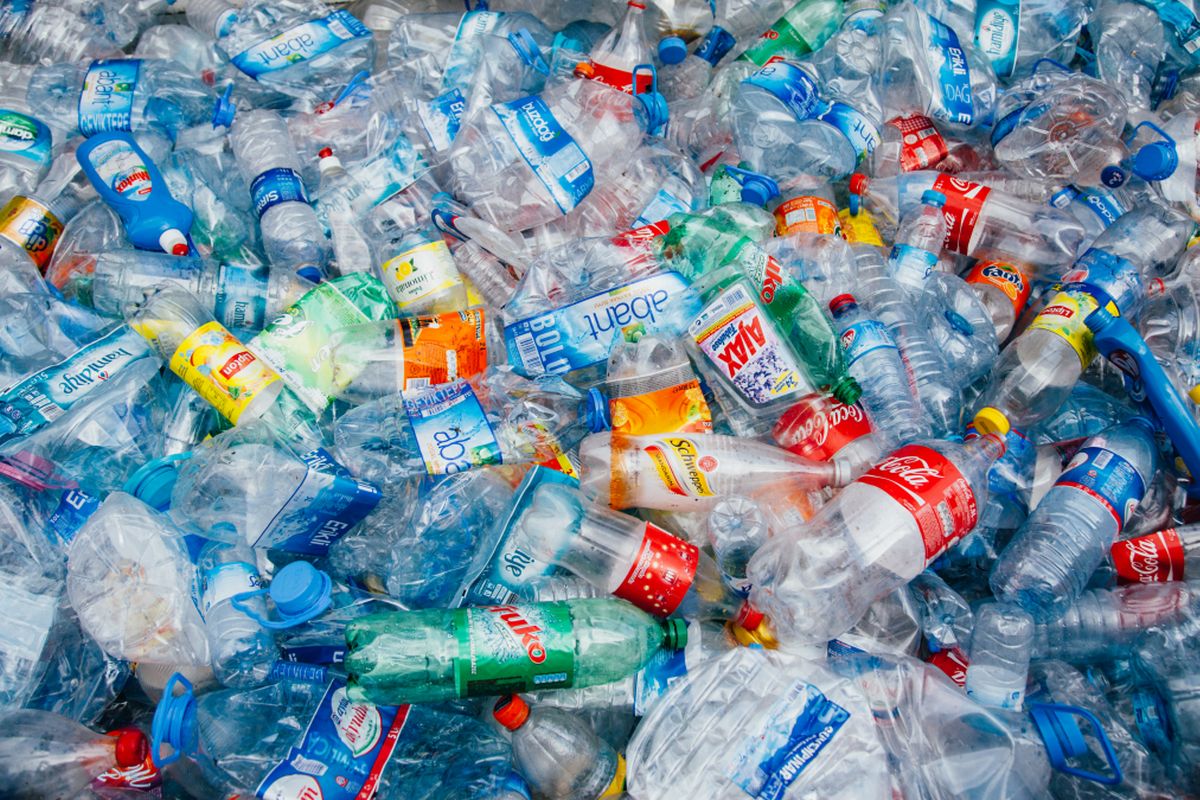Nhựa - vật liệu tưởng chừng vô hại lại đang âm thầm hủy hoại môi trường sống của chúng ta. Từ những chiếc túi nilon mỏng manh đến chai nhựa, ống hút, hộp xốp, nhựa len lỏi vào mọi ngóc ngách của cuộc sống, từ thành thị đến nông thôn, từ đại dương mênh mông đến những con suối nhỏ bé. Nỗi ám ảnh về rác thải nhựa ngày càng tăng cao, trở thành vấn đề cấp bách cần giải quyết. Trong bài viết này, EQUO sẽ giúp bạn hiểu rõ hơn về rác thải nhựa, từ định nghĩa, thực trạng đến những giải pháp hạn chế “nỗi ám ảnh” này.
1. Rác thải nhựa là gì?
Nhựa là vật liệu phổ biến trong đời sống hiện đại. Tuy nhiên, việc sử dụng quá nhiều đồ nhựa đã dẫn đến vấn đề rác thải nhựa ngày càng nghiêm trọng, là hồi chuông cảnh báo cho sự sống còn của Trái Đất. Việc mọi người hiểu rõ về rác thải nhựa, tác hại của nó và chung tay hành động là điều cần thiết hơn bao giờ hết.
1.1. Định nghĩa
Rác thải nhựa là những đồ dùng, vật dụng có chất liệu làm từ nhựa và không còn giá trị sử dụng. Chúng ta có thể dễ dàng bắt gặp rác thải nhựa trong cuộc sống hàng ngày như:
- Túi nilon: Loại rác thải nhựa phổ biến nhất, thường được sử dụng để đựng đồ trong các cửa hàng, siêu thị, chợ,...
- Vỏ chai: Vỏ chai nước ngọt, nước suối, chai bia, chai rượu,... làm từ nhựa PET, HDPE, PVC,...
- Cốc nhựa: Cốc nhựa dùng một lần trong các quán cà phê, quán nước,...
- Ống hút nhựa: Dùng để uống nước, trà sữa,...
- Hộp xốp: Dùng để đựng thức ăn, đồ ăn nhanh,...
- Và nhiều loại đồ dùng khác như: Bàn chải đánh răng, lược, đồ chơi,...
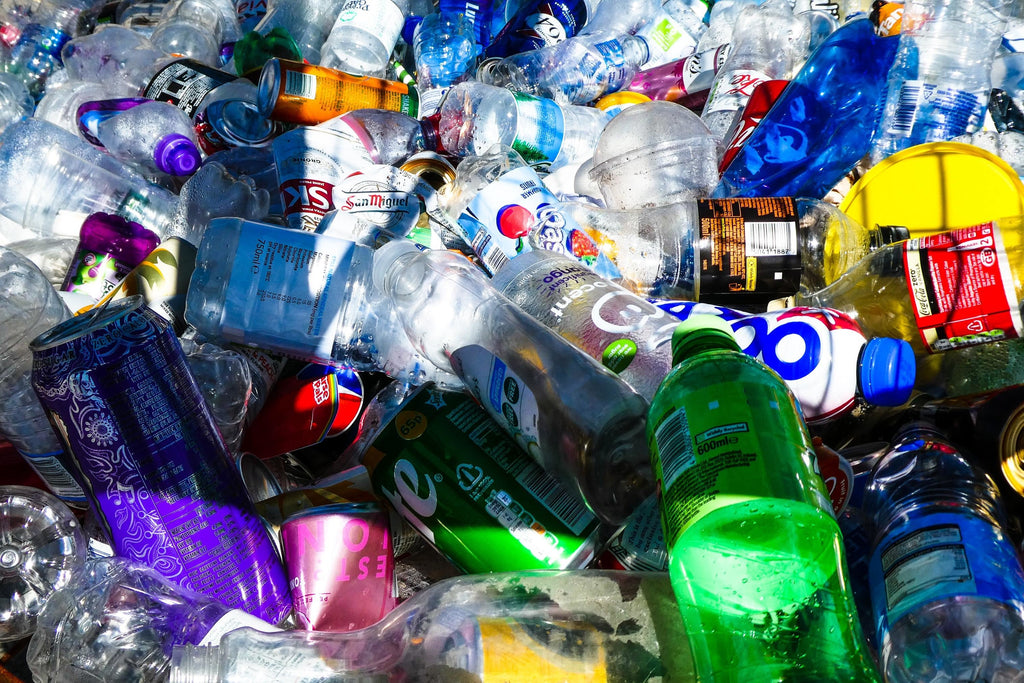
Nguồn: Internet
>> Xem thêm:
- Thực Trạng Tái Chế Nhựa: Những Điều Bạn Chưa Biết
- Tác Hại Của Ống Hút Nhựa: Sự Tàn Phá Nặng Nề Đối Với Môi Trường
- Thời Gian Nhựa Phân Hủy Trong Môi Trường Tự Nhiên Là Bao Lâu?
- Ô Nhiễm Đại Dương Là Gì? Nguyên Nhân, Hậu Quả Và Giải Pháp
- Tái Chế Rác Thải Nhựa
1.2. Phân loại rác thải nhựa
Việc phân loại rác thải nhựa giúp cho quá trình tái chế được dễ dàng và hiệu quả hơn. Rác thải nhựa được phân loại thành 2 loại chính:
- Nhựa tái chế được: Bao gồm các loại nhựa PET, HDPE, PVC, LDPE, PP,...
- Nhựa không tái chế được: Bao gồm các loại nhựa PS, EPS, PC,...
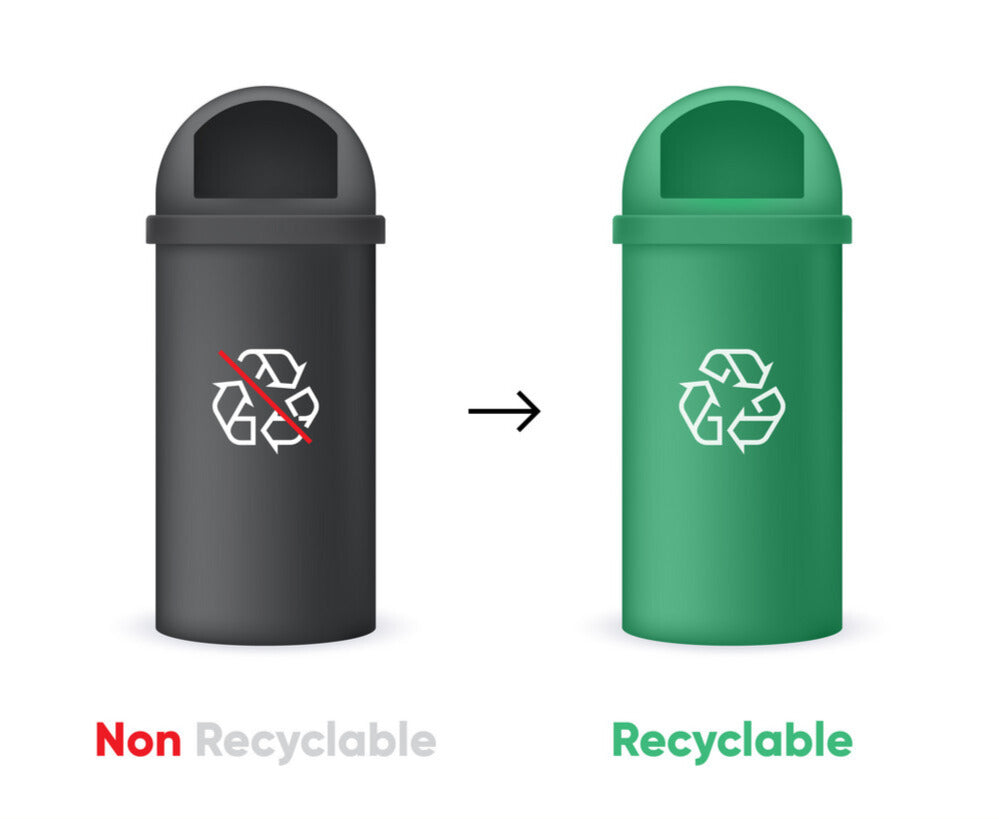
Nguồn: Internet
Như vậy, rác thải nhựa là một loại rác thải phổ biến và nguy hiểm, tồn tại dưới nhiều dạng thức khác nhau. Việc phân loại rác thải nhựa là bước đầu tiên để xử lý chúng một cách hiệu quả.
2. Thực trạng ô nhiễm nhựa hiện nay
Thực trạng ô nhiễm nhựa hiện nay đang ở mức báo động. Vấn đề này xuất phát từ nhiều nguyên nhân, gây ra những biểu hiện và hậu quả nghiêm trọng cho môi trường và sức khỏe con người.
2.1. Nguyên nhân gây ô nhiễm nhựa
Tình hình ô nhiễm nhựa hiện nay xuất phát từ nhiều nguyên nhân đan xen phức tạp. Vấn đề này cần được nhìn nhận một cách cặn kẽ để có giải pháp hiệu quả, dưới đây là một số nguyên nhân chính dẫn đến tình trạng ô nhiễm nhựa đang ngày càng trở nên nghiêm trọng:
- Sử dụng quá nhiều sản phẩm nhựa.
- Thiếu ý thức trong việc sử dụng và xử lý rác thải nhựa.
- Hệ thống xử lý rác thải nhựa chưa hoàn thiện.
- Công tác tuyên truyền, giáo dục về bảo vệ môi trường chưa hiệu quả.
- Chính sách quản lý rác thải nhựa chưa đồng bộ.
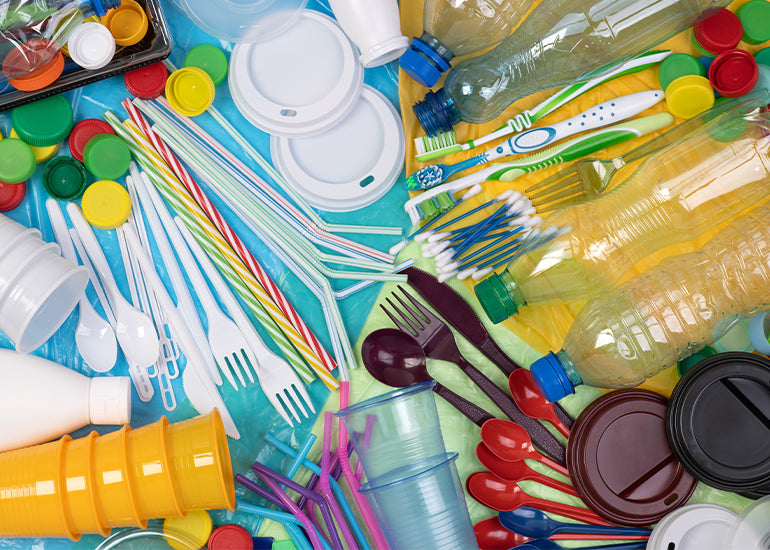
Nguồn: Internet
2.2. Các biểu hiện của ô nhiễm nhựa
Ô nhiễm nhựa đang là một vấn đề môi trường cấp bách, ảnh hưởng nghiêm trọng đến hệ sinh thái và sức khỏe con người. Biểu hiện của ô nhiễm nhựa xuất hiện ở nhiều nơi, dễ dàng nhận thấy trong cuộc sống:
- Rác thải nhựa xuất hiện ở khắp mọi nơi (trên cạn, dưới nước và cả trong không khí).
- Sự tích tụ của các mảnh vụn nhựa nhỏ bé, được gọi là vi nhựa, tồn tại trong môi trường và xâm nhập vào chuỗi thức ăn.
- Rác thải nhựa làm ô nhiễm nguồn nước, ảnh hưởng đến chất lượng nước và sức khỏe con người. Làm mất đi vẻ đẹp của môi trường, ảnh hưởng đến du lịch và chất lượng cuộc sống.
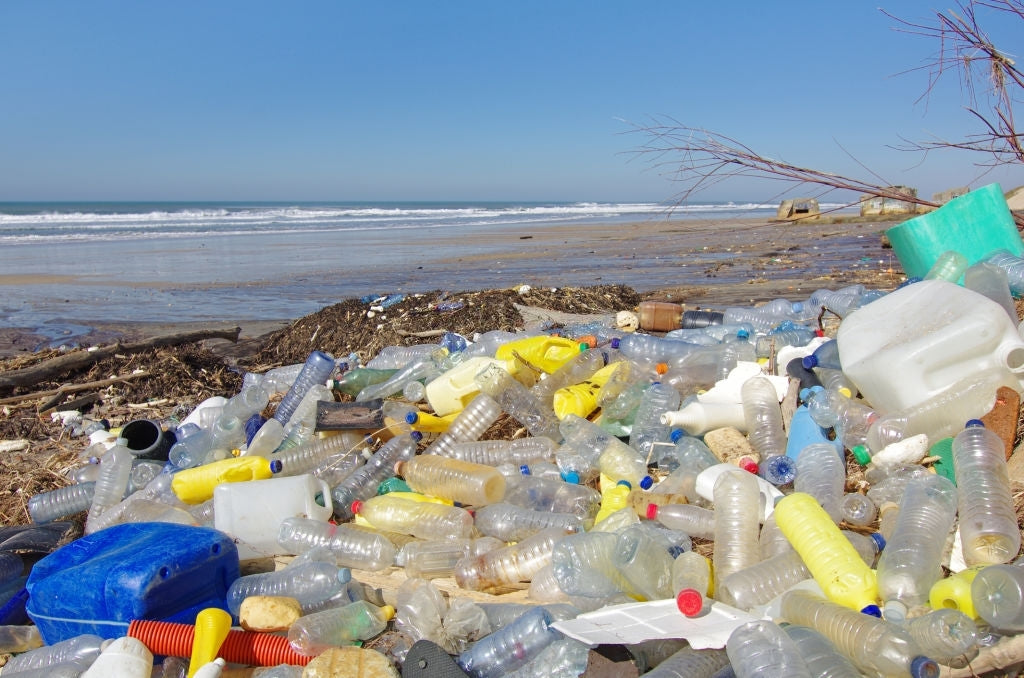
Nguồn: Internet
2.3. Hậu quả của ô nhiễm nhựa
Ô nhiễm nhựa không chỉ gây mất mỹ quan môi trường mà còn dẫn đến nhiều hậu quả nghiêm trọng cho hệ sinh thái và sức khỏe con người:
- Đối với môi trường: Gây ô nhiễm môi trường đất, nước, không khí; ảnh hưởng đến hệ sinh thái và biến đổi khí hậu.
- Đối với sức khỏe con người: Gây ra các bệnh về đường hô hấp, tiêu hóa, ung thư,...; ảnh hưởng đến sức khỏe sinh sản và phát triển của thai nhi.
- Đối với nền kinh tế: Gây thiệt hại về kinh tế do chi phí cho việc xử lý rác thải nhựa và khắc phục hậu quả của ô nhiễm môi trường.
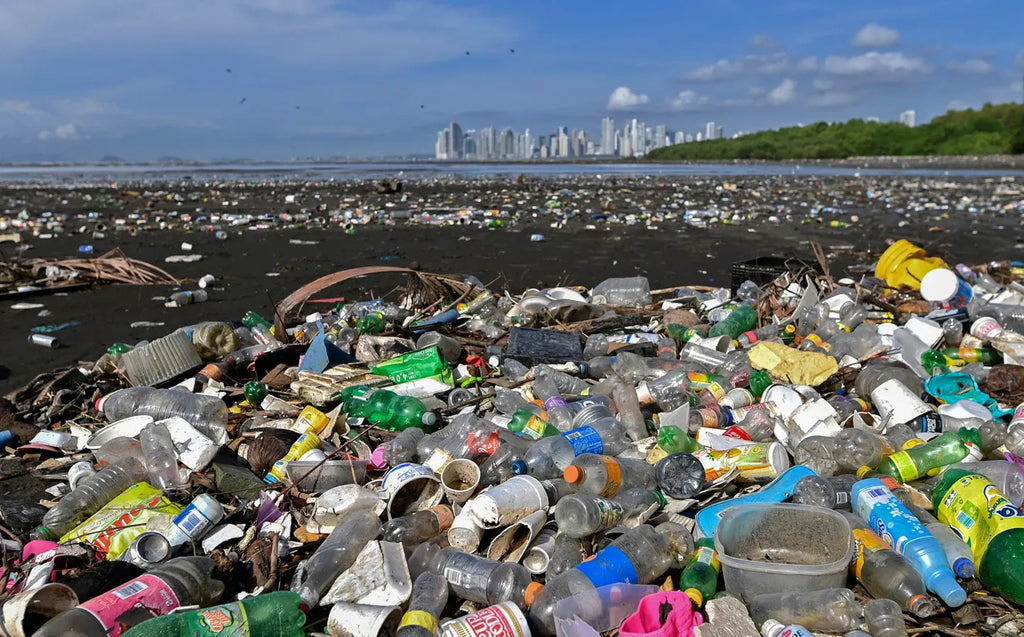
Nguồn: Internet
Thực trạng ô nhiễm nhựa hiện nay đang ở mức báo động và cần được giải quyết triệt để. Việc bảo vệ môi trường sống là trách nhiệm của mỗi cá nhân và cộng đồng. Chúng ta hãy cùng chung tay hành động để đẩy lùi ô nhiễm nhựa, bảo vệ môi trường xanh - sạch - đẹp cho chính bản thân và thế hệ tương lai.
3. Tại sao phải hạn chế rác thải nhựa?
Hạn chế rác thải nhựa là một vấn đề cấp bách cần được giải quyết bởi những tác động tiêu cực mà nó gây ra cho môi trường, sức khỏe con người và động vật. Nhựa tồn tại trong môi trường hàng trăm năm, gây ô nhiễm đất, nước và không khí.
3.1. Giảm thiểu tác động đến biến đổi khí hậu
Rác thải nhựa là một trong những nguyên nhân chính góp phần vào biến đổi khí hậu. Quá trình sản xuất và xử lý rác thải nhựa thải ra lượng lớn khí nhà kính, làm tăng nhiệt độ Trái Đất.
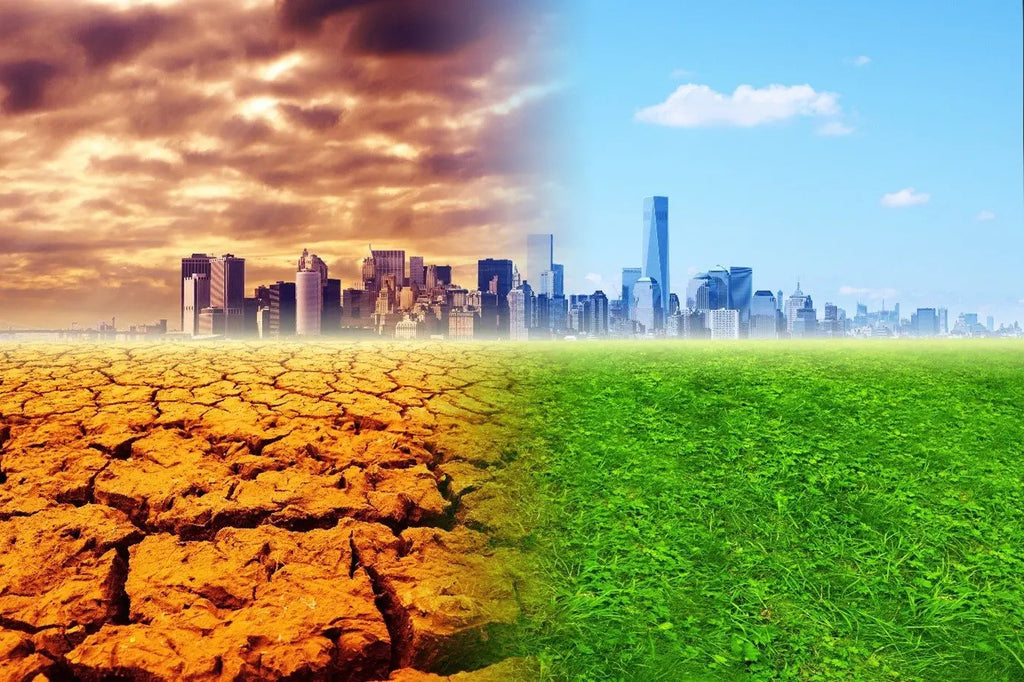
Nguồn: Internet
3.2. Bảo vệ sức khỏe con người và động vật
Rác thải nhựa gây ra nhiều tác hại nghiêm trọng đến sức khỏe con người và động vật qua nhiều con đường khác nhau:
- Gây ô nhiễm nguồn nước và thực phẩm
Nhựa thải ra môi trường sẽ dần phân rã thành những mảnh vụn nhỏ bé gọi là vi nhựa. Những vi nhựa này len lỏi vào chuỗi thức ăn, từ sinh vật phù du bé nhỏ, đến các loài cá, và cuối cùng là con người. Việc nạp vi nhựa vào cơ thể qua nguồn nước có thể dẫn đến nhiều vấn đề sức khỏe nghiêm trọng như tiêu hóa, tim mạch, thậm chí là ung thư.
- Gây tổn thương và tử vong cho động vật
Động vật thường nhầm lẫn rác thải nhựa với thức ăn và nuốt phải, dẫn đến tắc nghẽn đường tiêu hóa hoặc ngộ độc. Các mảnh nhựa sắc nhọn có thể gây tổn thương nội tạng. Việc bị mắc kẹt trong rác thải nhựa cũng có thể khiến động vật bị thương hoặc tử vong. Rác thải nhựa còn ảnh hưởng đến hệ sinh thái, làm giảm đa dạng sinh học và nguồn thức ăn của động vật.
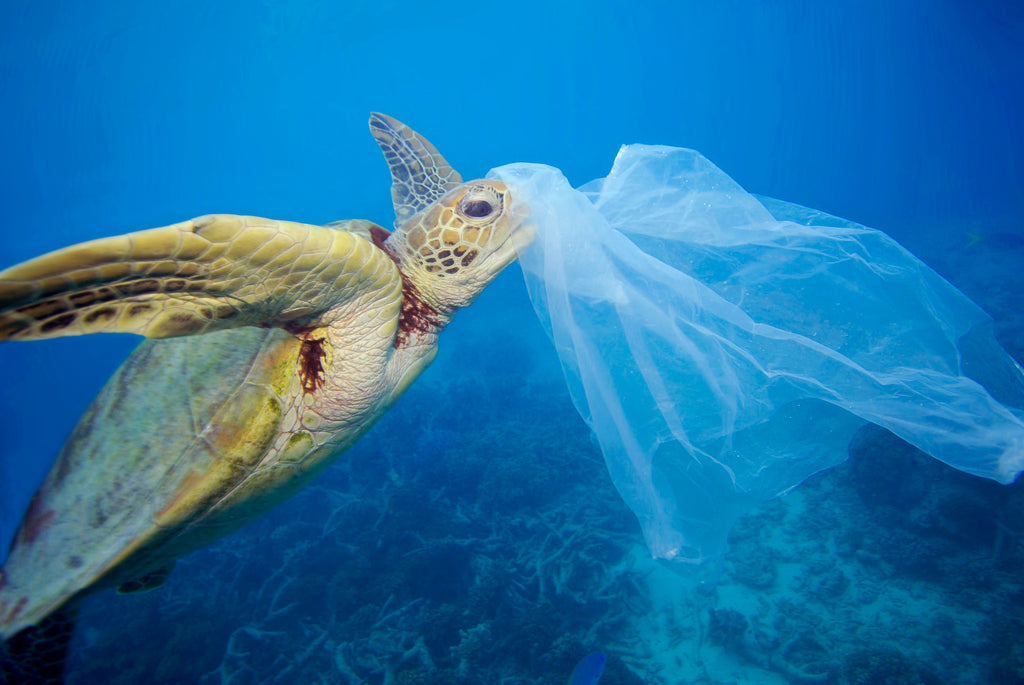
Nguồn: Internet
Hạn chế rác thải nhựa là một nhiệm vụ cấp bách và cần thiết để bảo vệ môi trường, sức khỏe con người và động vật. Việc giảm thiểu rác thải nhựa sẽ góp phần giảm tác động đến biến đổi khí hậu, bảo vệ nguồn nước và thực phẩm, và ngăn ngừa nguy cơ ngộ độc và tổn thương cho con người và động vật.
4. Một số biện pháp hạn chế rác thải nhựa
Hạn chế rác thải nhựa là trách nhiệm chung của mỗi cá nhân, tổ chức và chính phủ. Chúng ta cần thay đổi thói quen sử dụng đồ nhựa, ưu tiên các sản phẩm thân thiện với môi trường để bảo vệ sức khỏe của bản thân, cộng đồng và môi trường cho thế hệ tương lai.
4.1. Sử dụng sản phẩm thân thiện với môi trường thay thế nhựa dùng một lần
Thay vì sử dụng các sản phẩm nhựa dùng một lần như cốc nhựa, ống hút nhựa, chúng ta nên sử dụng các sản phẩm thay thế thân thiện với môi trường như ống hút thiên nhiên tự phân huỷ (làm từ gạo, cà phê, cỏ bàng,...), hộp đựng thực phẩm bã mía, ly giấy,... Những sản phẩm này được làm từ nguyên liệu thân thiện với môi trường, an toàn và tự phân huỷ trong thời gian ngắn, giúp giảm thiểu lượng rác thải nhựa thải ra Trái Đất mỗi ngày.
EQUO tự hào cung cấp đa dạng các sản phẩm thân thiện với môi trường, giúp bạn dễ dàng thay thế các sản phẩm nhựa dùng một lần trong cuộc sống hàng ngày.
- Bộ ống hút thiên nhiên tự phân huỷ: Được làm từ cà phê, bã mía, dừa, cỏ bàng và gạo, an toàn cho sức khỏe, tự phân hủy hoàn toàn trong môi trường tự nhiên.
- Hộp đựng thực phẩm: Được làm từ bã mía, là một nguồn nguyên liệu tự nhiên bền vững có thể tái tạo và phân huỷ một cách nhanh chóng. Đặc điểm nổi bật của sợi bã mía nằm ở tính chất bền chắc, linh hoạt trong khả năng đóng gói, và chất lượng thoáng khí, không thấm nước.
- Bộ dao, muỗng, nĩa: Đây là một lựa chọn tuyệt vời cho những ai đang tìm kiếm một bộ đồ ăn thân thiện với môi trường và bền đẹp.
- Bộ ly giấy với công nghệ tráng nước: Sử dụng công nghệ tráng nước, không tráng nhựa (PP, PE hoặc PLA) giúp quá trình sản xuất ít thải ra khí carbon và khi phân hủy không để lại các tác động xấu đến môi trường như ly giấy thông thường. Phân hủy hoàn toàn trong môi trường tự nhiên trong vòng 18 tuần, đa dạng kích thước, phù hợp cho nhiều mục đích sử dụng.
Hãy cùng EQUO chung tay sử dụng các sản phẩm thân thiện với môi trường, để biết thêm thông tin về các dòng sản phẩm EQUO, mời bạn truy cập link sau:
>> https://shopequo.com/vi/collections

4.2. Tái sử dụng đồ nhựa một cách an toàn
Tái sử dụng đồ nhựa là giải pháp hiệu quả cho môi trường nhưng cần thực hiện an toàn để bảo vệ sức khỏe. Nên chọn loại nhựa an toàn (ký hiệu tái chế và số 1, 2, 4, 5), kiểm tra kỹ lưỡng trước khi sử dụng, vệ sinh sạch sẽ, không dùng cho thực phẩm nóng hoặc trong lò vi sóng, hạn chế tái sử dụng nhiều lần.
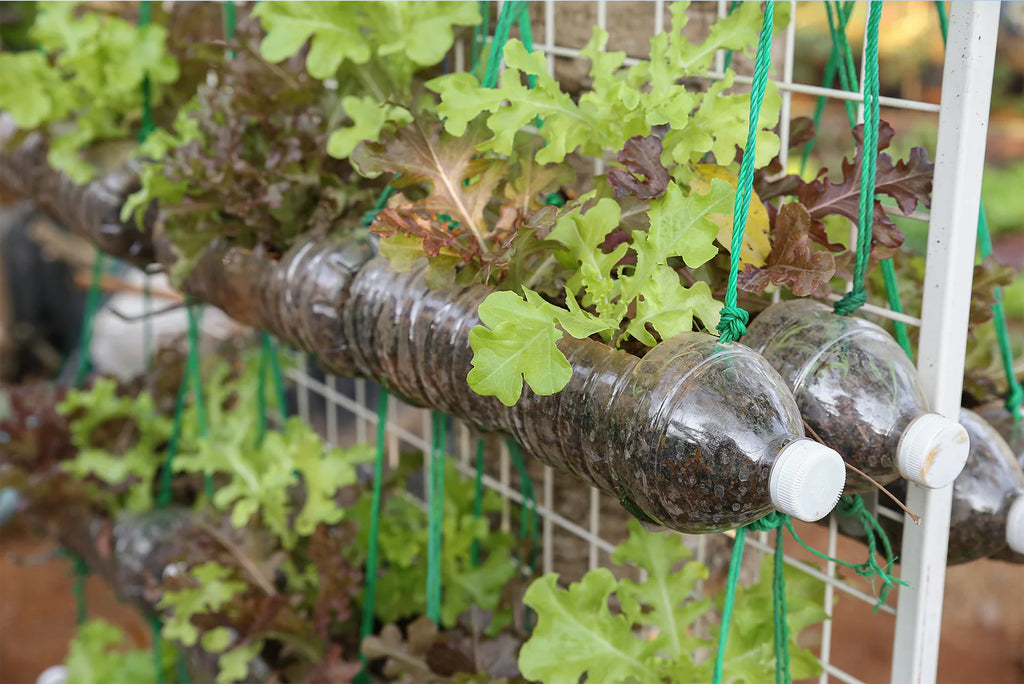
Nguồn: Internet
4.3. Phân loại và tái chế rác thải nhựa
Phân loại rác thải nhựa là bước đầu tiên để tái chế hiệu quả. Việc phân loại giúp thu gom các loại nhựa khác nhau, xử lý phù hợp và tạo ra nguyên liệu mới. Tái chế rác thải nhựa giúp giảm thiểu rác thải, tiết kiệm tài nguyên và bảo vệ môi trường. Có thể tái chế nhiều loại nhựa như chai PET, hộp HDPE, túi nilon LDPE và hộp PP. Tuy nhiên, cần lưu ý một số loại nhựa không thể tái chế như PVC, PS và PC.
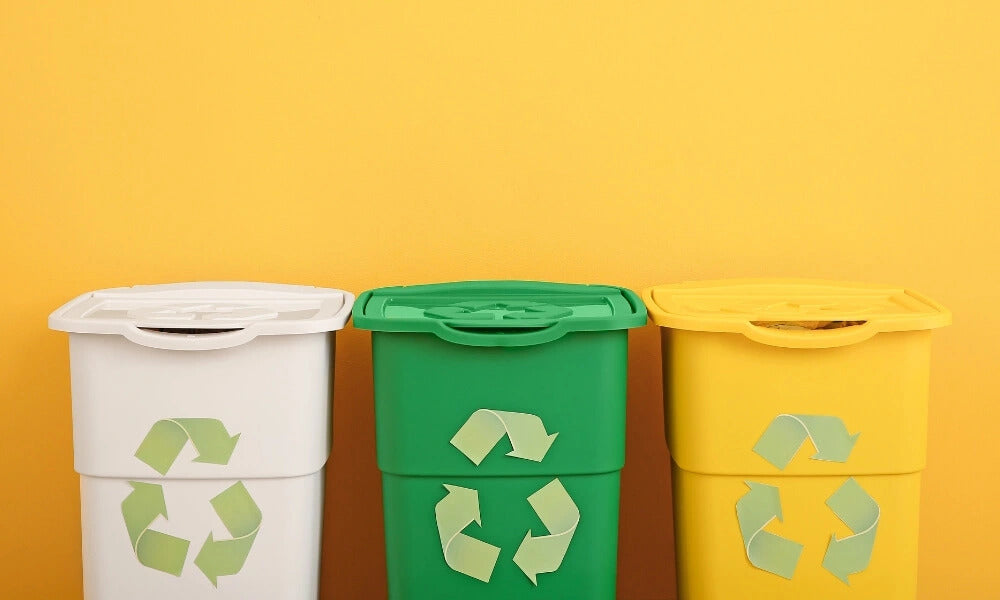
Nguồn: Internet
4.4. Tuyên truyền nâng cao ý thức mọi người
Rác thải nhựa đang là vấn đề nhức nhối, gây ô nhiễm môi trường nghiêm trọng. Để giải quyết vấn đề này, việc nâng cao ý thức cộng đồng trong việc hạn chế rác thải nhựa là vô cùng quan trọng.
Cần thực hiện các biện pháp tuyên truyền hiệu quả như:
- Đưa nội dung về tác hại của rác thải nhựa vào chương trình giảng dạy ở các trường học, tổ chức các hội thảo, tập huấn cho người dân.
- Phát sóng các chương trình truyền hình, tin tức, bài báo về tác hại của rác thải nhựa và lợi ích của việc hạn chế sử dụng.
- Khuyến khích sử dụng sản phẩm thân thiện với môi trường.
- Tổ chức các hoạt động thu gom, tái chế rác thải nhựa.
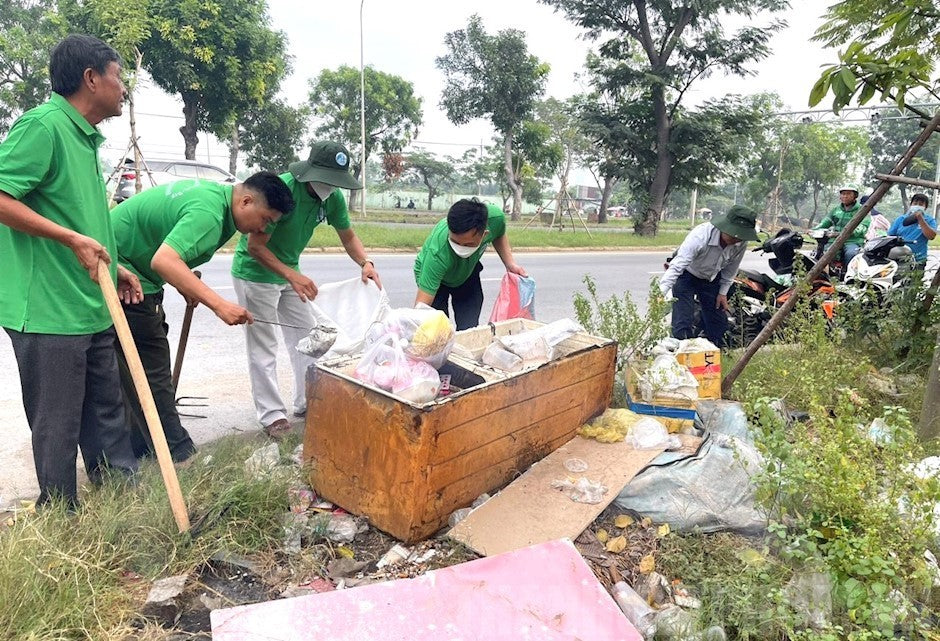
Nguồn: Internet
Hạn chế rác thải nhựa là trách nhiệm chung của mỗi cá nhân và toàn xã hội. Hãy thay đổi thói quen sử dụng, lựa chọn sản phẩm thân thiện với môi trường, tái sử dụng và phân loại rác thải nhựa đúng cách. Chung tay bảo vệ môi trường, xây dựng tương lai xanh cho chính bản thân và thế hệ sau.
Rác thải nhựa là vấn đề nhức nhối, gây ô nhiễm môi trường nghiêm trọng. Để giải quyết vấn đề này, cần có sự chung tay của mỗi cá nhân, tổ chức và chính phủ. Mỗi cá nhân cần nâng cao ý thức, thay đổi thói quen sử dụng, hạn chế đồ nhựa dùng một lần, sử dụng sản phẩm thân thiện với môi trường, tái sử dụng và phân loại rác thải nhựa đúng cách. Tổ chức và chính phủ cần có chính sách khuyến khích sử dụng sản phẩm thân thiện với môi trường, đầu tư vào hệ thống xử lý rác thải nhựa, đồng thời tuyên truyền nâng cao ý thức cộng đồng. Hạn chế rác thải nhựa là trách nhiệm chung, hãy chung tay hành động để bảo vệ môi trường sống của chúng ta.
Cùng EQUO chung tay bảo vệ môi trường!
